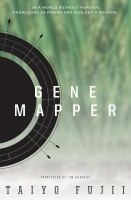 Author: Taiyo Fujii
Author: Taiyo Fujii
Translator: Jim Hubbert
U.S. publisher: Viz Media
ISBN: 9781421580272
Released: June 2015
Original release: 2013
Gene Mapper is Taiyo Fujii’s debut work as an author. Originally, he was employed in design and software development, a background that to some extent informs Gene Mapper. In 2012, he self-published the novel as an ebook and it became a bestseller, catching the attention of Hayakawa Publishing, a major Japanese publisher of science fiction. Fujii subsequently expanded and revised Gene Mapper for release by Hayakawa in 2013. It was this edition of Gene Mapper that became the basis for Jim Hubbert’s English translation of the novel released by Viz Media’s speculative fiction imprint Haikasoru in 2015. In addition to being a bestseller, Gene Mapper has also been critically well-received. Although ultimately the novel didn’t win, Gene Mapper was nominated for both a Seiun Award and a Nihon SF Taisho Award (which Fujii would later earn for his second novel Orbital Cloud). I was thus very happy to have the opportunity to read an early review copy of Gene Mapper.
Mamoru Hayashida is a gene mapper specializing in style sheets for color expression and design. Although he works as a freelancer, many of his recent projects have been for L&B, one of the leaders in distilled crops, a science in which plants have been designed from their DNA up to produce bountiful harvests with high nutritional value that are resistant to disease and pests. The problem of world hunger has been solved because of distilled crops, but there continue to be people who are skeptical of these synthetic creations, believing them to be unnatural, unethical, and unsafe. When SR06, an advanced strain of Super Rice that Hayashida helped to design, begins to inexplicably mutate, it seems as though those criticisms may be justified. In order to investigate and hopefully put a stop to the impending crisis before the media and the rest of the world finds out about it, Hayashida is first sent to Ho Chi Minh City to hire Yagodo, an expert Internet salvager, and then to the SR06 fields in Cambodia along with his agent Kurokawa. It’s only after they are there that they discover just how dire, and dangerous, the situation really is.
Gene Mapper falls into the category of realistic near future science fiction and it is an excellent example of that subgenre. A few elements initially drew me to the novel, specifically the developments and applications of new agricultural and biotechnologies, but the more I read the more I found to capture my interest, such as the implications of the collapse of the Internet (an event that occurred before the beginning of the story proper) and the prevalent use of augmented realities of varying types. Some of those new technologies and systems are unnecessarily over-explained towards the beginning of the novel, bogging down the story, but soon the details become better integrated into the narrative and Gene Mapper begins moving along quite quickly. Although human society in Gene Mapper is still believably imperfect, Fujii’s vision of the future and the role of technology in it is largely a positive and optimistic one. While the potential for technological developments to be used for great harm is a recognized concern in the novel, those same advancements are also shown have the potential to be used to greatly benefit humanity. The tension between those two possibilities is one of the driving forces behind the novel.
What makes Gene Mapper such a thought-provoking and engaging work is the importance placed by Fujii on technology and science and how people interact with them. The novel’s exploration of the tremendous potential presented by new technologies as well as it’s examination of related concerns and fears is extremely relevant to issues being discussed even today. I grew up in a farming community and so am well aware of the debates and controversies surrounding the use of genetically modified crops and other advanced agricultural technologies. Gene Mapper presents one plausible future based on logical extensions of current genetic, agricultural, and information technologies without ignoring the dangers that they present or how they impact society in both positive and negative ways. Just as in reality, scientific advances in Gene Mapper don’t exist in a vacuum. There are personal and societal interests as well as business and commercial interests at work in the direction that the future will take. Missteps have been and will be made, but innovations will continue as long as humanity is able to survive them. Gene Mapper argues that in time solutions will be found to old problems and new challenges will arise as a result.
Thank you to Viz Media for providing a copy of Gene Mapper for review.

[…] collection of short horror manga by Junji Ito, Taiyo Fujii’s debut novel Gene Mapper, which I recently reviewed, and Ping Pong: The Animation. And I’m happy to see Netcomics continue to release new series, […]